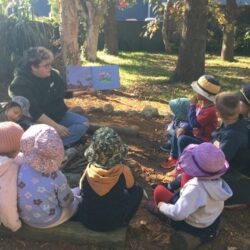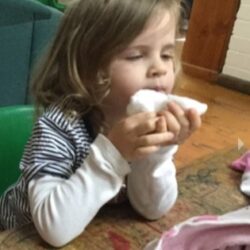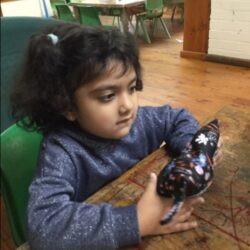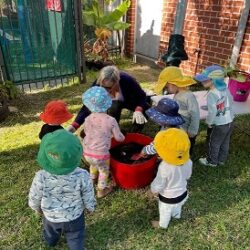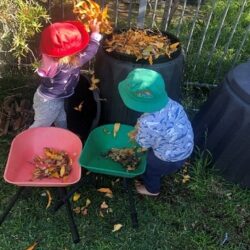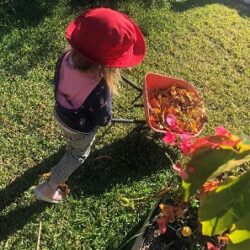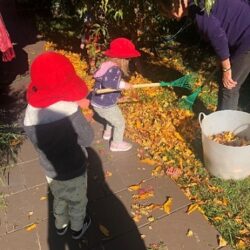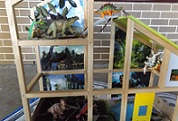Johnson House
Story by Educators Sofia and Alisa
Indigenous perspectives are embedded in our daily program at Johnson House. To celebrate National Reconciliation Week (27 May-3 June), and to teach the children about this year’s theme ‘More than a word’, Educators have been reading the picture book ‘Finding Our Heart’, by Thomas Mayor with them. This was a great starting point to discuss why we make an Acknowledgement of Country every morning at our daily check-in groups.The children also learnt another way to make an Acknowledgement of Country, by singing the song ‘Our Song’, which Educator Alisa used to sing with the younger children at Murray House. This song was originally composed by the preschool children in Gorton House a couple of years ago, and sharing it with the children in Johnson House promotes a sense of belonging and community. Singing this song prompted children’s understanding that we acknowledge the land because we are learning and playing on Aboriginal land.
As we looked at the pictures in the book, the children learnt about the Aboriginal flag and explored the map of Aboriginal nations and languages and learned about the way of living that First Nations people have long established, making them the oldest culture in the world.
Since The Infants’ Home’s reconciliation tree project was launched last week for NRW, families and staff have been engaged in writing their reflections about what reconciliation means to them. The children have had the opportunity to visit the reconciliation tree at reception, and to help Educators to attach the postcards on which the children and Educators have responded to the question ‘What does reconciliation mean to you?’ The children also saw some Indigenous resources, artefacts and posters that had been set up in the reconciliation tree area, and they completed some puzzles. They also noticed a poster of bush tucker food that we also have in our Indigenous corner at Johnson House.
Robinson House
Story by Educator Denise
This week the children at Robinson House have been exploring how their words can affect their friends, and they have been focusing on ‘cotton wool’ words.
To begin the experience, Educator Denise passed around a zipped up bag for the children to feel. The children observed that the bag felt “warm and cuddly”, “squishy”, “soft”, “full” and “lovely”. Denise then unzipped the bag, which was filled with cotton wool. The children appeared soothed by the fluffy texture of the cotton wool, and they commented on how good it felt against their skin. Denise then asked the children to imagine that the cotton wool represents words that are kind, helpful and respectful to others, as a way of explaining how words can impact our wellbeing and feelings. The children and Denise brainstormed what cotton wool words and statements might sound like to them. The children gave suggestions such as:
“Cotton wool words are sharing” (Maggie)
“Cotton wool words sound gentle and loving”
“Denise, cotton wool words is very calm; is it “Can you play with me?” Cotton wool words?” (Audrey)
“I like soft words” (Hanaa)
“It’s so fluffy and soft. I like cotton wool words” (Sofia)
“Denise, we can share and play with everyone.” (Maggie)
“These words make me feel good”
After brainstorming and forming an understanding of what cotton wool words mean and sound like, together Denise and the children read the story ‘Grumpy Frog’, by Ed Vere. Denise encouraged the children to find words in the story that sounded kind and respectful; they were able to identify the cotton wool words used when the pink rabbit offered to be the sad green frog’s friend, and the words used when the green frog apologised to his friends when his grumpiness hurt their feelings.
Family Day Care Sydney Wide
Earth Day at Randwick Playgroup
Story by Educator Support Officer Maureen
Supporting the protection of our planet and restoring habitats for living creatures can start at any age.
Today the children at our Family Day Care Sydney Wide’s Randwick Hub playgroup continued to help green our outdoor environment by collecting dried leaves to add to our compost bin.
We then filled a lovely pot, which we rescued from going to land fill on a council cleanup day, with the soil already prepared in our compost bin. Then we added our plant cuttings—now to sit back and observe our plants grow!
Community Playgroups
Story by Playgroup Coordinator Rebecca
At our playgroups we like to be able to use our toys in lots of different ways. We had an old dollhouse that we didn’t use any longer, and thought that it might be a fun idea to turn it into a dinosaur house instead. We found everything we needed to make the dinosaur house from around our homes, so we didn’t have to buy anything to build it.
The dinosaur house has been a real hit with the children at playgroups, and they have had a wonderful time exploring dinosaurs and their new home. To make the idea of repurposing our old dollhouse work even better, we can change the pictures on the back of the house and add different toys and figures to make new settings such as a farm, a jungle or maybe even a four-wheel drive environment. One of our playgroup children was so inspired by the dinosaur house that they went home and emptied out their own dollhouse’s furniture and moved their dinosaurs in!
